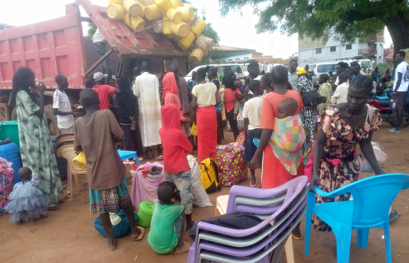At least 367 returnees have arrived in Torit Town in Eastern Equatoria State on Tuesday and Wednesday following the reduction of food rations in Kakuma Refugee Camp in neighboring Kenya.
The returnees said they walked from Kakuma to Nadapal after the World Food Program (WFP) stopped food aid for category three and four refugees, leaving them stranded with no food and water.
Unfortunately, on their way to South Sudan through Lokichogio, an undisclosed number of returnees reportedly died of hunger, thirst, and harsh conditions.
Last month, the WFP reportedly cut aid by 60 percent for vulnerable groups, including pregnant women and disabled people, and by 80 percent for refugees with some kind of income. This resulted in violent protests at Kakuma, one of Kenya’s largest refugee camps, that left one dead, following months of increased tensions over aid cuts.
Sunday Night Walter, a returnee and mother to five, said severe hunger and lack of food forced her and her family to voluntarily walk back home for 10 days.
“We came from the camp because of suffering; we did not come in good faith. The issue of reducing food for some categories of refugees caused us more suffering. Initially, there was no problem, and we never even thought of returning home,” she explained. “Refugees with large families who do not have relatives to support them might perish. Those with young children will lose some of them on the way back home because it is a tough journey, and people are dying along the road. The government should have helped returnees upon their arrival at Nadapal border.”
“The government should allocate us a space and build some shelters to accommodate us,” Night added.
She said some of the returnees were lucky to get lifts on tipper trucks from the border to Torit.
Lino Marko Lomiyang, another returnee, said he is happy to have arrived safely and reunited with his family after 13 years.
“I came from Kakuma Refugee Camp, where I lived for almost 13 years. I came voluntarily because there is extreme hunger and suffering,” he said. “I am happy because I can now move freely. There is no freedom of movement in the refugee camp, and if you attempt to go to Nairobi or Lodwar, they arrest and jail you. We need our government to support the returnees and refugees in Kenya by repatriating them voluntarily.”
For his part, Jimmy Kilang, the interim chairperson of the state civil society network, urged the government to provide security and safe passage for returnees.
“We are extremely happy following the arrival of our people from different places back home. We learned that these returnees came on foot from Kakuma up to Narus and Kapoeta, and that some are in critical condition,” he said. “We appeal to the government to provide security to allow the remaining population to return home. I am also urging the government and humanitarian agencies to join hands in providing their basic needs.”
Meanwhile, Khadija Clement Kong, the deputy chairperson of the Relief and Rehabilitation Commission (RRC) in the state, said most of the returnees were reunited with their families.
“As a government, we are aware of the returnees, some of whom joined their families,” Kong stated. “We are going to sit down to see what we can do for those who arrived and to help those still moving on foot.”




